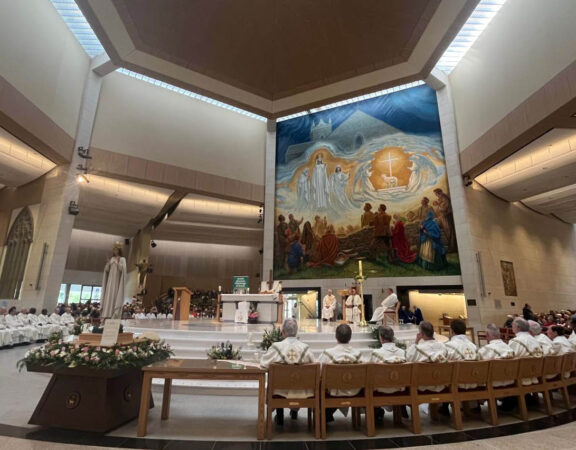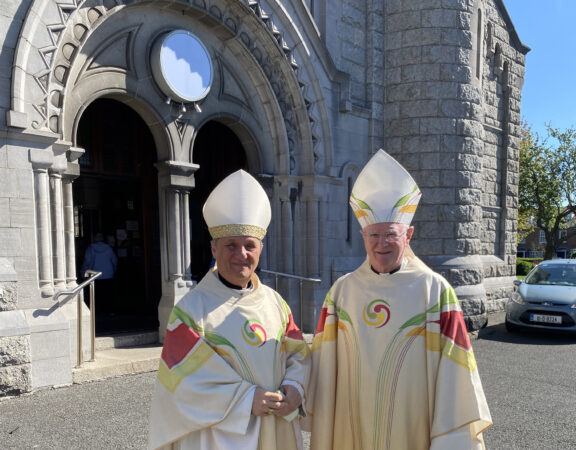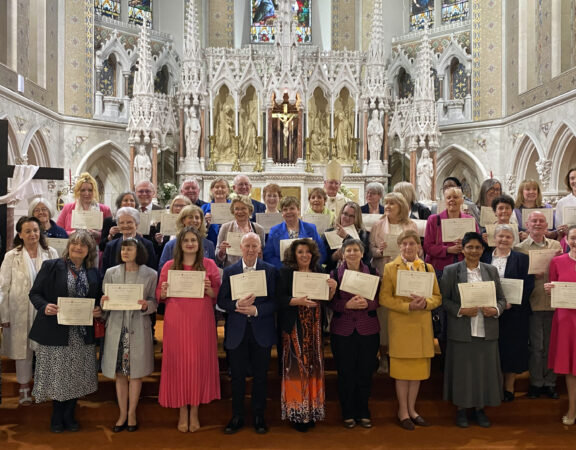Pastoral Theology Conference
CHALLENGES AND OPPORTUNITIES FOR MINISTRY
Speaking Notes of
Most Rev. Diarmuid Martin
Archbishop of Dublin and Primate of Ireland
Most Rev. Diarmuid Martin
Archbishop of Dublin and Primate of Ireland
———-
Milltown Institute, 7th November 2008
Milltown Institute, 7th November 2008
I am pleased to be here at the opening of this Conference on Pastoral Ministry which takes as its overarching theme the question asked by Jesus in Saint Marks’ Gospel: “Who do you say that I am?”
For most of the month of October I was in Rome attending the XII Ordinary General Assembly of the Synod of Bishops on the theme of “The Word of God in the Life and Mission of the Church”. It was an interesting occasion, described to me by one Bishop as an act of reception on the Dogmatic Constitution Dei Verbum on Revelation, which has in many ways been a poor relative among the documents of the Vatican Council. The Roman Catholic Church has a long way to go to re-discover the centrality of the Word of God in its own life, and as the great treasure we share with our brothers and sisters of other Christian denominations. I look forward to seeing how we can intensify our biblical apostolate in the Archdiocese of Dublin in the years to come.
One of the very practical pastoral reminders that were brought home to me listening to the over 200 interventions of Bishops from around the world during the Synod was that you should be careful about using short excerpts from the scriptures, taken outside their context in the scripture and away from the context from which they emerged.
So I was left a little uneasy about simply referring to the short scriptural text which was presented in the title of your Conference, and felt that I must turn back to Saint Mark’s Gospel to see in a little more detail what the text is about and what its context is.
The context opens out many interesting aspects of the text which are relevant to our theme. I can only presume that this was indeed obvious to the scholars who prepared the Conference and chose the text, but allow me, not as a scripture scholar but as one with responsibility for the renewal of pastoral thrust in a populous and diverse diocese, to trace out my own reflections around that text as you begin your two days.
If we look at Mark 8, we see first of all that the question “who do you say that I am?” is the follow-up to another question “Who do people say that I am?” This seems to be saying that one should expect a difference in the quality of answer about the identity of Jesus on the part of those who are called to be his more intimate disciples, as opposed to the well-intentioned bystanders or what we might call today the general public.
But the matter turns out to be not quite so simple. Many people at the time of Jesus had heard about him, had seen him, had heard something about his words and his actions. The question about “who he was” was being asked by many, with varying responses and varying motivation. The reaction of some is hostility and rejection. Others, like those from his own home town felt that they knew all about him and his family any way. Paradoxically, that information – in itself totally correct – became an obstacle to them recognising Jesus’ true identity. There were also many who were puzzled by his identity but who began to look towards him – in this case incorrectly – as perhaps the reappearance of some powerful figure of the Old Testament, or as a precursor of something important to come,
Curiously, the incontestable facts which the inhabitants of his own home town had, led them away from his identity, while the incorrect conclusions of those who thought him a prophet reappeared may in fact have been the beginnings of an attitude which is open to faith, even if the content of that faith is as yet still unclear.
The question becomes even more complex. Jesus now turns to his close followers and asks them who they say he is. The response of Peter is of such correctness that it would seem to satisfy even the most exacting professor: Peter proclaims: “You are the Christ”. Yet curiously this reply does not elicit an overenthusiastic reaction on the part of Jesus. In the Gospel of Mark, Jesus simply warns them not to talk to anyone about this.
Here again see that many of our black and white answers about where we begin to encounter Jesus in his true identity are inadequate. The people who are puzzled about Jesus identity and come to apparently the wrong conclusions, at least show that they do have some idea as to where they should be looking to understand who Jesus is and how his identity and mission can be understood. They do so by reference to the great figures who appear along the path of God’s dealing with his people. They look to those who along the path of the history of salvation were those who purified faith from the many incursions of false God’s which had defiled faith in their history – a phenomenon which continues also in our contemporary society.
The apparently correct answer of Peter, on the other hand, turns out also to be an imperfect answer, since effectively while Peter appears to recognise Jesus as the Christ, his understanding of who the Christ was to be was far from the truth. Immediately after asking this question, Jesus begins to reveal dimensions of his own identity and mission which Peter cannot accept. Jesus begins to talk of a Messiah whose identity would be revealed in rejection and violent death. Peter’s response reveals itself shortly afterwards, despite its apparent correctness, to be more the vision of Satan than of God.
The disciples who heard the question “who do you say that I am” thought they had it definitively right. Jesus’ questioning was however only the beginnings of a process which would indeed take the disciples on a path they never imagined and found hard to accept. Jesus teaching was such as to turn their understanding of God and of Jesus head over heels. Jesus’ revelation about himself shocks them and only very slowly do they begin to realise that they must open their minds and the hearts in such a way that not just their minds but their whole way of life was about to be changed and turned head over heels.
Our topic is pastoral theology. It is about a theology able to reach out and challenge all of us about our understanding of the identity of Jesus and how that challenge affects the way we live as individuals and as the Church, the community of the followers of Jesus in the realities of today.
The first thing that we have to stress then is that the response we are talking about is not something of our own construction. It comes from the self-revelation of God who appears in Jesus Christ as a God who loves us with an infinite gratuitousness. On our own we can never totally fathom such a love. It is a self-giving love which will never allow us to be smug and self satisfied about our fully knowing who Jesus is. It is a love that challenges us day be day in a deeper manner to be gripped in our being by the person and the life of Jesus himself.
Like Peter who gives what appears to be a perfectly correct answer, all forms of self-defined correctness may lead us completely astray in our seeking for Jesus, while some of the less correct searching of contemporary bystanders may well be a sign of a sincere, positive openness and beginning of the road to true faith.
Faith has to be inculturated and inserted into the particular realities of the times and we need to have a precise and accurate idea of what those realities are. The face of belief in Ireland is changing and we have to admit that for one of the most catechised populations of all Europe, if you think in terms of the period of religious education that our young people receive right throughout their primary and secondary education, that there is no way to feel smug about the situation of faith in our midst.
Statistics are useful but may be misleading. The indications recently gathered about religious practice in the Archdiocese of Dublin seem to show that practice on an average Sunday is below 20% of the population and that over the past three years there has been a drop of about 11%. Mass attendance on its own is not an all embracing criterion to estimate people’s religious adherence or the level of their faith. Many attend religious service on a regular but not weekly basis. Others who might never attend Church still remain religious persons and are indeed good people, full of ideals and commitment and care for others, whose faith is not adequately explicated yet certainly not absent.
Indeed, it is possible that those with inadequate answers may be closer on the path to faith as those who can recite all the right answers, but whose understanding of faith is miles wide of what true faith us.
I am struck by the many people I encounter whose faith is not the joyful and free response to the message of a God who loves us, but one which is fearful and insecure and full of anxieties. On the other hand, there are others whose faith and life-style are marked by an arrogance and self assertiveness which is far from the simplicity and lovingness which must be a mark of the believer in Jesus.
Faith must be inculturated, but faith must also be de-culturated, it must always have that freshness which allows it challenges the underlying cultural values of any age in the light of the Gospel, also in areas where that will make us unpopular and even experience rejection and ridicule. Every culture is invaded by false Gods which distort and defile true faith.
Every culture and every generation can fall prey to superficial human reflection which projects as good what may be a long way from how reality is seen by the eyes of God. Each culture can bring newness but each culture can be like that factual knowledge of Jesus’ own townsfolk and can actually be a hindrance from being able to understand Jesus.
The Synod on the Word of God, in its final message, refers to the Church as “The House of the Word”. Pastoral theology must be a realisation of that reality, the Church as the place where the word is preached, broken and accepted, especially in the context of the Breaking of the Bread and in a spirit of prayer and brotherly love.







